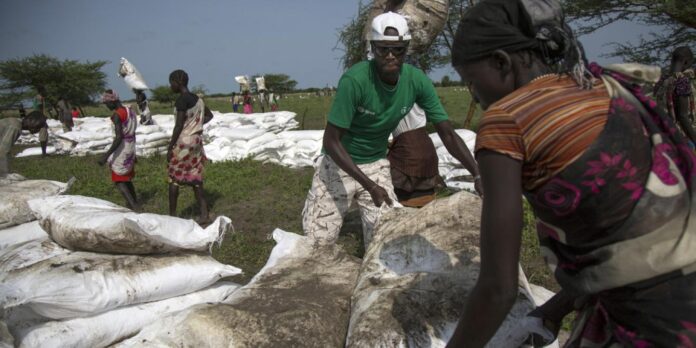By Malish Valentine Adolfo, Torit
Humanitarian efforts to deliver crucial aid to flood victims in Lafon County, Eastern Equatoria State, have been severely hampered by deteriorating road conditions.
The ongoing floods, which have ravaged parts of the county, have left thousands of residents stranded and in dire need of assistance.
However, the poor state of the road network has made it nearly impossible for aid agencies to reach those most affected.
In an exclusive interview with Radio Emmanuel, the Chairperson of the Relief and Rehabilitation Commission expressed deep concern over the situation.
He revealed that Lafon County was one of the first areas identified to receive general food distribution under the Integrated Phase Classification (IPC) for food and nutrition.
The IPC is a globally recognized tool that helps humanitarian agencies identify areas most in need of food assistance. Lafon was flagged as a high-priority area due to the severe impact of the floods.
“Lafon is one of the counties in Eastern Equatoria that is supposed to receive general food distribution under the IPC.
Unfortunately, the poor road conditions have prevented us from delivering the much-needed aid to the stranded population,” the Chairperson stated.
He went on to describe the plight of the residents, many of whom have been without food or clean water for days, as the flooding has cut off access to essential services and markets.
The Chairperson also highlighted the challenges faced by humanitarian workers who are trying to navigate the treacherous roads.
“Our teams are ready to assist, but the roads are either completely submerged or have been washed away, making it impossible to transport supplies,” he explained.
He emphasized that the situation is critical and that immediate intervention is needed to ensure that aid reaches the vulnerable populations in Lafon.
In response to the crisis, the government has announced plans to implement long-term infrastructure projects aimed at preventing future flooding in the area.
“The long-term solution involves constructing reservoirs and channels that can store floodwater and prevent it from inundating villages and roads.
These reservoirs could also provide a source of water during the dry season, which would be a significant benefit to the community,” the Chairperson said.
However, he cautioned that these projects require substantial financial investment and time to complete. “Given the current economic situation, we are still in the planning stages, and it will take time before we can begin construction.
But we are committed to finding a sustainable solution to the flooding problem in Lafon,” he added.
The situation in Lafon remains precarious, with residents urging the government and international agencies to expedite aid delivery before the situation worsens.
The Relief and Rehabilitation Commission continues to appeal for support from the international community to address immediate humanitarian needs while working on long-term strategies to mitigate the impact of future floods.

